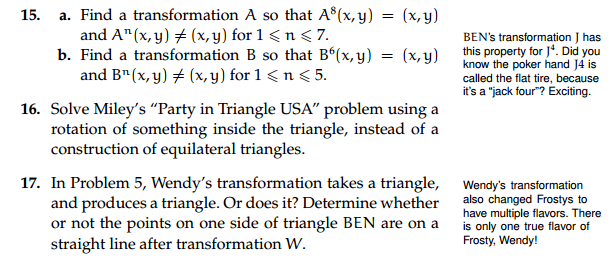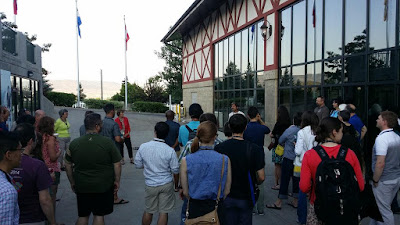For the next few weeks, I will be posting five things I've learned each day. Some will be math related, others education related. Some will probably be random thoughts that make no sense. Anyway, here we go:
1. Poolside lectures in the are the best type of lectures. I skipped the first cross-program lecture to make a visit to the resort pool. Fortunately, there was a professor who also had the same idea. Today’s topic: parameter and moduli spaces.
2. Stoves are more useful than jacuzzi tubs. Due to a shortage of rooms, my roommate and I are not in a Villa, and therefore do not have a kitchen to cook in. However, we have been given the Enzian “Honeymoon” Penthouse Suite, complete with an oversized shower, fireplace, king sized bed, and three person jacuzzi tub (no less than three feet from the bed, might I add). We’re hoping to barter use of the tub for some pots and pans.
3. There is a marked difference between the volleyball skills of New York teachers and Los Angeles teachers. I wonder why...
4. Based purely on anecdotal evidence, teachers in New York Public Schools seem to feel that they are restricted from moving standards from one course to another (e.g. moving quadratic functions to Algebra II) because of the NY Regents Exams.
5. Many of the proofs, properties, and theorems that we wrestle with in geometry can be much more intuitively explained and understood with transformations. More on that later.
Tuesday, June 30, 2015
Sunday, June 28, 2015
What is PCMI?
The Park City Math Institute is a collection of mathematics programs that happen every year in Park City Utah. Except for this year, when we are at the Zermatt Resort in Midway, Utah. And a few years back when they were in Princeton, New Jersey. And probably next year.
In any case, there are programs for teachers, undergraduate college faculty, undergraduate students, graduate students, and mathematics researchers. I, of course, am in the Teacher Leadership Program. Our normal day starts with breakfast with other math teachers and researchers. It's nice to be able to both reflect and discuss with other teachers from around the country, and meet some pretty high-caliber mathematics researchers.
The bulk of the mornings are filled with two sessions. The first is Developing Mathematics where we work in groups of six to complete a problem set. The problems are written by Darryl Yong and Bowen Kerins, and are some of the most amazing problems I have ever attempted. First, they are flawlessly scaffolded. Each day's problems is divided into "Important Stuff", "Neat Stuff", and "Tough Stuff". The important stuff are concepts that are integral to problem sets in later days, and are carefully chosen as to subtly hint at a major idea or astounding connection and let you draw your own conclusions. The problems flow gracefully from one onto the next and build on each other. If you don't have time to get to the neat or tough stuff, don't worry; they will appear in a different incarnation on a later day. Note: that is neither Darryl nor Bowen below.
Darryl and Bowen are also hilarious. They offer prizes for coming to class on time (Fig Newtons and Leibniz Biscuits) and put references, jokes, and puns into the side and foot notes. Here is a sample:
We also have Reflection on Practice where we observe classes, read student work, and discuss pedagogy. It's interesting to see different teacher's perspectives from different parts of the country. After RoP, its lunch with all the other programs.
In the afternoons, we create professional development and resources for teachers. I am part of a group that is writing a four part online webinar to help geometry teachers understand the transition to a transformation based perspective of congruence and similarity under Common Core. I'm working with James King and Gabe Rosenberg, but more on that later.
There are a number of afternoon and night activities including graduate math lectures, technology demonstrations, special interest groups on standards based grading, meeting important people, polyhedron origami sessions, hikes (local and far away), volleyball games while discussing growth mindset, and of course, talking math education by the pool.
Subscribe to:
Posts (Atom)








